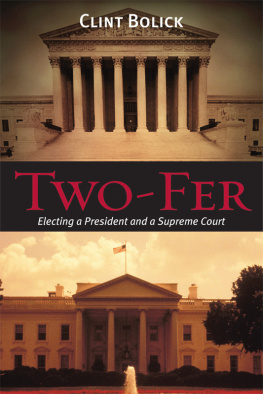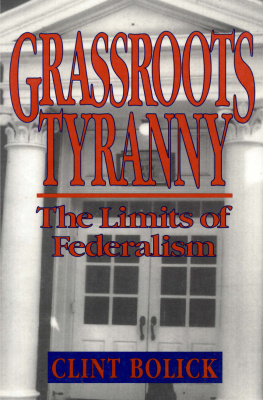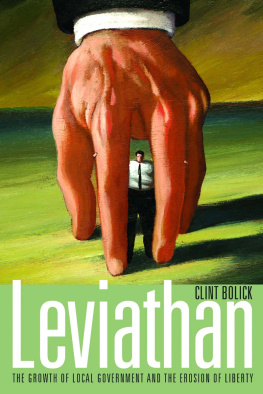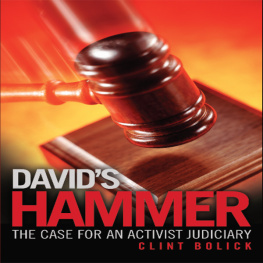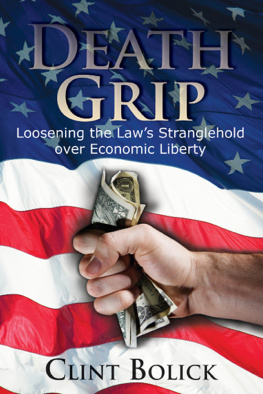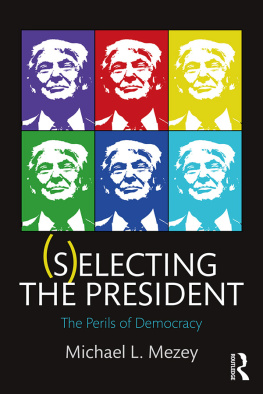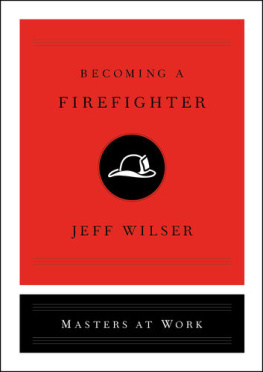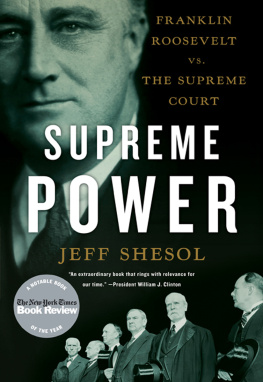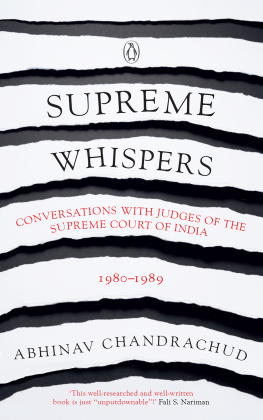ELECTING A PRESIDENT
AND A SUPREME COURT
CLINT BOLICK
HOOVER INSTITUTION PRESS
STANFORD UNIVERSITY | STANFORD, CALIFORNIA
The Hoover Institution on War, Revolution and Peace, founded at Stanford University in 1919 by Herbert Hoover, who went on to become the thirty-first president of the United States, is an interdisciplinary research center for advanced study on domestic and international affairs. The views expressed in its publications are entirely those of the authors and do not necessarily reflect the views of the staff, officers, or Board of Overseers of the Hoover Institution.
www.hoover.org
Hoover Institution Press Publication No. 621
Hoover Institution at Leland Stanford Junior University, Stanford, California 94305-6010
Copyright 2012 by the Board of Trustees of the
Leland Stanford Junior University
All rights reserved. No part of this publication may be reproduced, stored in a retrieval system, or transmitted in any form or by any means, electronic, mechanical, photocopying, recording, or otherwise, without written permission of the publisher and copyright holders.
For permission to reuse material from Two-Fer: Electing a President and a Supreme Court , ISBN 978-0-8179-1464-6, please access www.copyright.com or contact the Copyright Clearance Center, Inc. (CCC), 222 Rosewood Drive, Danvers, MA 01923, 978-750-8400. CCC is a not-for-profit organization that provides licenses and registration for a variety of uses.
First printing 2012
Manufactured in the United States of America
Cataloging-in-Publication Data is available from the Library of Congress.
ISBN: 978-0-8179-1464-6 (cloth. : alk. paper)
ISBN: 978-0-8179-1466-0 (e-book)
For my friend George F. Will,
Americas greatest political commentator,
with deep appreciation for his passion for freedom and baseball.
ACKNOWLEDGMENTS
I AM VERY GRATEFUL to the Hoover Institution for publishing this book. As a constitutional litigator, I am reminded every day of the importance of the men and women who serve as judges on our federal and state courtsand of the people who appoint them. Although I am militantly independent in my politics, and rarely if ever have voted a straight party ticket, the fact is that political affiliation often matters greatly in the appointment of judges, which in turn sets the course of American law. In particular, when presidents name justices to the U.S. Supreme Court, they can be making the most significant decisions they ever make in terms of lasting and direct impact on the American people and their freedoms. Yet, while for those reasons the appointment of Supreme Court justices and other federal judges should be a central factor in choosing a president, judicial selection usually plays an invisible role in presidential campaigns. I hope this small book will help broaden the discourse about the importance of judicial nominations in current and future cam paignsnot just in campaigns for president but also for the senators who confirm the nominees and the governors who appoint state court judges.
I am also grateful to the Goldwater Institute and its supporters for allowing me to engage in the enormously rewarding practice of constitutional law; and to my research assistants, Justin Bohall and Kathryn Blades, for their contributions to the book. To the reader, I offer my appreciation and the hope that you will find this book useful and provocative.
The Grand Prize
E VERY A MERICAN PRESIDENTIAL ELECTION presents different burning issues. The Vietnam War dominated three con secutive elections from 1964 to 1972. Scandals from Teapot Dome to Watergate have figured prominently in others. Recessions typically thrust economic issues to the forefront, leading one presidential campaign to adopt the famous campaign imperative, Its the economy, stupid! Other issues from abortion to forced busing to education to the environment have made major appearances in national campaigns.
Issues come and go, and the impact of national elections in resolving these issues sometimes is minor or fleeting. But one issue that rarely makes even a cameo appearance in national campaigns nonetheless may be the most important and enduring consequence of electing a president: the party that controls the White House also controls the appointment of the federal judiciary. This is one matter on which the party in power, especially over the last several decades, makes a decided differencewhich in turn directly affects the lives of every single American.
Judges typically operate in relative obscurity. Except for lawyers who practice before them, few Americans can name more than a few members of the U.S. Supreme Court, much less judges on other federal or state courts. Yet judges are powerful and important. Judges make decisions every day about religion, speech, property, business, education, civil rights, and myriad other issues that touch all of us in direct and immediate ways. They set the rules and guide the proceedings by which accused criminals are tried and punishment is meted out. Ultimately, they determine whether our most fundamental rights are enforced or destroyed.
Think for a moment about who the most powerful woman has been in American history. One might nominate several candidates, but unquestionably the most accurate answer is former United States Supreme Court Justice Sandra Day OConnor. She served as an associate justice of the Supreme Court for a quarter century. Not only was she the first woman to serve on the Court, she was its only female member for most of her tenure. But for many years, she stood far taller in influence than her male colleagues, for typically she was the swing vote in many five-to-four decisions. On matters ranging from abortion to racial preferences to school vouchers to the rights of criminal defendants to federalism, hers was often the deciding vote, and that vote repeatedly changed the course of American history.
Nor is the U.S. Supreme Court necessarily more important than other federal courts. The Supreme Court accepts review in only a tiny fractionsometimes as little as one percentof the cases brought to it for review. The vast majority of federal cases are decided by the hundreds of judges who serve in federal district courts and courts of appeals.
And nor are federal courts in the aggregate necessarily the most important American courts. Most cases are brought in state courts. The vast majority of cases involving crimes, property, contracts, torts, and family lawoften the most deeply personal types of casesare decided in state courts. States have their own constitutions, which typically are more expansive and detailed than the U.S. Constitution. What is moreand as I will discuss in greater detail in the postscriptstate courts are free to construe individual rights protected in their constitutions more broadly (but not more narrowly) than the rights protected by the federal Constitution.
So courts and judges are enormously important. And yet, come election time, almost nobody thinks about them. Why? Perhaps it is because we are taught in civics class that judges are insulated from politics. Federal judges, of course, have lifetime tenure and only can be removed through impeachment. Over the course of history, few have been removed. During their tenure, they enjoy an independence from political influence that most public officials only can dream about. This independence is a vital part of our republican system of government, for judges who are dependent upon the political branches of government (that is, the executive and legislative branches) are likely to be little inclined to hold those branches to the boundaries of their constitutional authority or to protect individual rights against government abuse.




